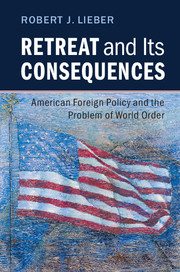Book contents
- Frontmatter
- Dedication
- Contents
- List of figures and tables
- Acknowledgments
- Introduction
- 1 Foreign policy retreat and the problem of world order
- 2 Burden sharing with Europe: problems of capability and will
- 3 Middle East policy: regional conflicts and threats to national interest
- 4 BRICS: stakeholders or free-riders?
- 5 Retreat and its consequences
- 6 Can America still lead – and should it?
- Index
5 - Retreat and its consequences
Published online by Cambridge University Press: 05 May 2016
- Frontmatter
- Dedication
- Contents
- List of figures and tables
- Acknowledgments
- Introduction
- 1 Foreign policy retreat and the problem of world order
- 2 Burden sharing with Europe: problems of capability and will
- 3 Middle East policy: regional conflicts and threats to national interest
- 4 BRICS: stakeholders or free-riders?
- 5 Retreat and its consequences
- 6 Can America still lead – and should it?
- Index
Summary
Since the last National Military Strategy was published in 2011, global disorder has significantly increased while some of our comparative military advantage has begun to erode.
– Gen. Martin Dempsey, Chairman of the Joint Chiefs of StaffFor more than seven decades, the international role of the United States has included, inter alia, creating and sustaining international institutions, supporting regional stability, providing deterrence and reassurance for allies, opposing the proliferation of nuclear weapons, underpinning the global economy, promoting trade liberalization and economic development, environmental protection, and – often but not always – encouraging human rights and democratization. In that unique capacity, it effectively served not only as the leader, defender, and promoter of the liberal democracies and market economies, but also of the rules and norms of the existing international order, the durability of which so many take for granted.
Now, however, America is less robustly engaged and faces a world in which power is more diffused. Revisionist states of varying sizes and capabilities – China, Russia, Iran, North Korea, Venezuela – pose more formidable or at least more stubborn challenges to the existing order. At the same time, longtime allies in Europe as well as Japan mostly find themselves less willing or capable of projecting power or of paying significant economic, political, or military costs in addressing common international concerns and sustaining global order. Commitments by countries such as Britain, France, Germany, and other Northern European states to combat climate change or to aid economic development in sub-Saharan Africa represent partial exceptions, as does the French role in combating al-Qaeda and ISIS in sub-Sahran Africa (the Sahel), but their overall effect on security and order remains limited.
In addition, neither the BRICS nor other emerging powers have been inclined to contribute to solving collective action problems at the global level, let alone preserving Western inspired rules and institutions toward which their own views range from indifference to hostility. Ironically, that predisposition is typically the case for countries that have greatly benefitted from these arrangements, notably China, but also Brazil, Turkey, Malaysia, and others.
This brings us back to the question of whether or not the active engagement and leadership of a powerful America is essential for the maintenance of regional and world order and for dealing with urgent international problems.
- Type
- Chapter
- Information
- Retreat and its ConsequencesAmerican Foreign Policy and the Problem of World Order, pp. 89 - 111Publisher: Cambridge University PressPrint publication year: 2016

